

Is it possible to earn a PhD while working? The brutal truth
Working alongside your PhD seems like an attractive proposal until you look at all of the different commitments you need to make to actually get a PhD and submit your dissertation. Working part-time may help PhD students financially but it often comes at an academic cost.
It is possible to earn a PhD while working. However, it requires strict time management and can be very complicated. You have to balance any other significant commitments inside and outside of your PhD.
A PhD is typically the equivalent time commitment as a full-time job. The majority of the PhD students I know work at least 40 hours a week. So, trying to get a PhD while working is very time intensive – 80-hour + weeks.
Some students drop down to a part-time PhD in order to balance all of the particular commitments of a PhD program and working hours.
Whether or not you are a part-time PhD student or you are studying your PhD full-time, here are all of the aspects you should consider if you are considering working alongside your PhD research. This is what you need to know if you are considering getting your doctorate while working.
Can you work during a PhD?
Some institutions full-out ban their PhD students from working full-time alongside a full-time research commitment. They want to make sure that you’re working 100% on your PhD because balancing work isn’t easy.
Although it may not be banned in some institutions it is generally expected that students focus on their research and coursework full-time during a PhD and are therefore not typically able to hold down a full-time job.
Some programs may allow for part-time work, but it is generally not recommended as it can interfere with academic progress.
Additionally, many PhD programs offer funding in the form of stipends or fellowships which can help support students financially during their studies.
There are a few things to consider if you are thinking of working during your PhD.
The first is whether or not you will have enough time to dedicate to both your work and your studies. You don’t want your work to suffer because you are spending too much time on your PhD, or vice versa.
Another thing to consider is how working will affect your funding.
If you are receiving PhD funding or a scholarship from an external source, they may have stipulations on whether or not you can work while receiving their funding. Be sure to check with them before taking on any paid work.
Lastly, you will want to make sure that the work you are doing is related to your field of study. Working in a related field can help you with your research by giving you real-world experience that you can apply to your studies.
Even though some institutions allow you to work, should you?
Should you work during your PhD?
Some students feel that they need to work in order to support themselves during their PhD, while others feel that they can focus solely on their studies.
There are pros and cons to both approaches.
Working during your PhD can help you to cover your living expenses and may even allow you to save some money. However, it can also be a distraction from your studies and may make it more difficult to find time to do research.
I know that I wouldn’t be able to balance the pressures of a full-time job with my PhD studies and, therefore, decided to not have any jobs during my first year – this included jobs inside the University such as demonstrating in undergraduate laboratories.
Therefore, it is possible to do a PhD whilst working full-time but you really have to consider the impact of the extra pressures and commitments
. It is much easier to work alongside your PhD if you have a strong research-based masters degree and your job outside of your degree is flexible enough to allow you to attend different academic commitments such as attending seminars, meeting with advisers, and travelling to conferences.
Ultimately, the decision of whether or not to work during your PhD is up to you.
Consider your financial situation and how working would impact your studies before making a decision.
It can be difficult to juggle work and study commitments, and you may find yourself feeling overwhelmed and stressed. You may also have less time to socialize and enjoy your student life.
So, it’s important to think carefully about whether working during your PhD is right for you.
What type of work can you do during a PhD? Part time or Full time?
During your PhD there are a number of different options that you could consider if you want to (and you are allowed to) get a job.
I do not recommend working full-time alongside your PhD but, there are some options for part-time work to earn a little bit of money alongside your studies.
Full time work
My recommendation is that you do not try to fit a PhD alongside full-time work. Trying to work full time is asking for trouble.
There will be so many more pressures on you that it will not be a very enjoyable experience.
A PhD requires you to be creative.
Creativity comes from having enough mental space to allow your mind to connect new and interesting ideas together. If you are busy with work you will not have the mental capacity to be able to do this effectively.
Therefore, I recommend that you consider at least dropping down to part-time work if you are insistent on pursuing a PhD alongside employment.
I have seen PhD students complete a PhD part-time supported and partly funded by their current place of employment.
Part time work
If you want to know more about the best PhD student part-time jobs check out my full guide – click here for the full article.

There are a variety of part-time jobs that can easily supplement your income during a PhD.
The best PhD student part-time jobs will have flexible hours, provide you with a reasonable hourly rate, and not distract you from your primary goal of completing your PhD.
I have highlighted in my YouTube video, below, all of the different side hustles that PhD students can try if they need to earn a little bit more money.
The common part-time jobs for PhD students include:
- Hospitality
- Customer service
- University-based jobs – such as tutoring, marking exams, student services and working in laboratories
- Online jobs such as user testing, notetaker, and translating.
- Freelancing. Selling a skill that you have two people on services such as Upwork .
Why Should You Worry About Working During Your PhD
There are a number of reasons why you should worry about working during your PhD.
The most important is balancing workload, the fact that you were extending your time in academia by a significant amount, the increased risk of burnout, and ensuring you have enough resources to keep you going for multiple years.
A PhD is just like a full time job.
Therefore, getting a PhD while working full-time will be incredibly difficult. Both commitments will require at least 40 hours per week each.
Nonetheless, if you are able to have full flexibility on your work schedule and you are capable of distance learning for some part of your PhD it may be much more possible.
Many PhD students struggle with just the commitments of earning a doctorate. Consider working alongside your PhD very carefully.
Time it takes
A PhD will typically take between three and seven years. During this time it is extremely stressful and you need to make sure you’re capable of researching at your best for the entire time.
I have always said that a PhD is a marathon and not a sprint. Adding extra years to your PhD if you need to can be worth it. However, you must consider the amount of time it will take you to get your PhD and the potential return on that investment.
Unless you have a particular career secured or in mind for after your PhD the extra years it takes to complete a doctoral degree part-time are generally not worth it.
Burnout is a real consequence of doing a PhD.
By working alongside your PhD you’ll increase your chances of burnout significantly. This is true even if you like to study.
If you are prone to feelings of being overwhelmed I would stay away from earning a PhD whilst working full or part-time.
Slowly introduce part-time work if you need to once you have settled into the general routine of your PhD.
Tips for Earning Your PhD While Working
Here are a few general tips that may help you if you find yourself having to work alongside your PhD:

Talk to everyone involved
Everyone involved in this process needs to be on board. There will be times when you need to ask favours from your supervisor, colleagues, work supervisor or others.
Don’t be afraid to ask for help: Whether it’s from your supervisor, colleagues, or friends and family, don’t hesitate to ask for help when you need it.
This is not a sign of weakness, but simply a recognition that we all need assistance from time to time.
Stay Organized and on Track
Find a routine: Try establishing a set schedule for at least most days of the week and stick to it as much as possible. This will help you to stay focused and make the most of your limited time.
Get Involved in the Research Community
Remember to stay in touch with your research community.
Working part-time or full-time can mean that you miss out on the exciting recent advancements and collaboration with people in your field. Make an extra special effort to attend seminars, talks, and networking events to help progress your research and your academic career.
Don’t squirrel yourself away!
Work with your strengths
Know yourself: Be honest about how well you work under pressure and how much free time you realistically have.
If you know that you work better with a tight deadline, then try to structure your work schedule accordingly.
Personally, I need as much free mental space is possible to perform at my best. Just do what is best for you.
Wrapping up
This article has been through everything you need to consider if you are tempted by earning a PhD while working.
Your PhD programme may dictate whether it is possible to work alongside your PhD. Whether or not it is a good idea will be down to you and if you are able to balance an insane amount of commitments and work.
My general recommendation is that you should focus 100% on your PhD journey and although it is definitely possible you’re going to be at risk of burnout.
Combining part-time PhD’s, part-time jobs, and finding a flexible job that will help keep you focused on the primary goal of finishing your dissertation is the most sensible way of working alongside your PhD.

Dr Andrew Stapleton has a Masters and PhD in Chemistry from the UK and Australia. He has many years of research experience and has worked as a Postdoctoral Fellow and Associate at a number of Universities. Although having secured funding for his own research, he left academia to help others with his YouTube channel all about the inner workings of academia and how to make it work for you.
Thank you for visiting Academia Insider.
We are here to help you navigate Academia as painlessly as possible. We are supported by our readers and by visiting you are helping us earn a small amount through ads and affiliate revenue - Thank you!

2024 © Academia Insider

Community Blog
Keep up-to-date on postgraduate related issues with our quick reads written by students, postdocs, professors and industry leaders.
5 Things to Consider Before Doing a PhD While Working

- By Nicholas R.
- August 19, 2020

Those interested in getting a PhD but dreading the several years of no income or a stipend that doesn’t meet their needs may consider a part time or even a full time job. That way, they can gain experience in the field, save up a little money and have a non-academic route they could later make use of. After all, if you’ve already made it to the point where you’re eligible to study at PhD level, you’ve already proven that you have great time management skills and that you can dedicate yourself to your studies, right?…
It might sound like a workable plan to many, but getting a PhD while working might not be as easy as you may think. Take it from many PhD students and postgrads who warn that it a slippery slope from a part time PhD to no PhD at all.
If you decide to go down this route, keep the following considerations in mind to give you the best chance of succeeding.
1. Know Your Programme
Some part time PhD programmes, especially the ones offered by online universities and distance learning schools, are well suited for those who want to work and study at the same time. Some aren’t as rigorous or time-consuming as others, and in some fields, the experience of working in industry through your current career will be a great benefit. A part time PhD will also have a more manageable workload , and supervisors will usually be more experience in providing support to working students. But keep in mind that some PhD part time programmes will not be eligible for financial aid or funding , at which point part time study may no longer be personally worth it.
2. Know Your Job
If your work is related to your field of study and your employers understand and support the requirements of your PhD, you will have a much less stressful few years. Therefore, one of the first things you’ll want to do is to get your employer on your side.
You can go about this by sitting down with them and explaining what your research will be about, how it will benefit your professional development and how it will benefit them as a business. You will also want to reassure them that you’ll be able to remain committed to your job during your studies, as this is likely to be their biggest concern. Don’t just stop at their verbal support, ask your manager to sit down with you to discuss the possibility of funding support, study days and the assignment of a mentor if your workplace has a doctorate holder.
Finding a PhD has never been this easy – search for a PhD by keyword, location or academic area of interest.
3. Know Your Situation
If you have young children, a sick parent, or generally any commitments that require hours of your time, it’s probably best to stay a full time student. If your field requires many publications or relies heavily on being able to network and interact with other researchers, keep in mind that you probably won’t be able to live up to their expectations if you already have work commitments you need to keep up.
4. Know Your Supervisor
Your supervisor should be supportive of the fact that you’re attempting to carry out a PhD whilst working part time rather than seeing it as a hindrance. As is to be expected, part time students generally struggle more than full time ones due to having greater external commitments, less contact time and a longer programme duration (beyond five years). You will want to find a PhD supervisor who is aware of these challenges, and if at all possible, try to get one who has taken this path themselves.
A good supervisor won’t only limit their support to physical help , such as introducing you to other researchers, suggesting relevant literature and facilitating data access, but also to emotional and mental support. A supportive supervisor maintains a good attitude and demonstrates concern for your research project. They should be keen to see you excel, help you refine your research skills and make you feel confident enough to experiment with your research approach and share your work whenever the opportunity presents itself, whether it is at a conference or in your place of work. Although you will be responsible for navigating yourself through your doctorate, a good supervisor will act as your safety net for when you get a little lost.
5. Know Yourself
Even the most organised people aren’t prepared for the workload that comes with a PhD. Make a time chart and be truly honest with yourself about how much time you have in the day, it might not be as much as you would think once you’ve factored everything in. Doing a part time PhD requires about 15-20 hours of commitment per week – will you have 15 hours to spare alongside your job, family and friends and other obligations? If not, then working and studying at the same time will most likely be out of your reach.
These considerations will hopefully put you in a better position to tackle a PhD while working part time (or dare I say it, working full time!). Even still, tackling a several year long PhD programme whilst working is probably one of the hardest things you will do, so if you decide to go down this road, much kudos to you.

In the UK, a dissertation, usually around 20,000 words is written by undergraduate and Master’s students, whilst a thesis, around 80,000 words, is written as part of a PhD.

Are you always finding yourself working on sections of your research tasks right up until your deadlines? Are you still finding yourself distracted the moment

This post explains where and how to write the list of figures in your thesis or dissertation.
Join thousands of other students and stay up to date with the latest PhD programmes, funding opportunities and advice.

Browse PhDs Now

An academic transcript gives a breakdown of each module you studied for your degree and the mark that you were awarded.

In this post you’ll learn what the significance of the study means, why it’s important, where and how to write one in your paper or thesis with an example.

Dr Griffith gained her PhD in Neuroscience from Northwestern University in 2015. She is now a neuroscientist and children’s book author and will be opening her own lab in the Department of Physiology and Membrane Biology at the University of California Davis later this year (2020).
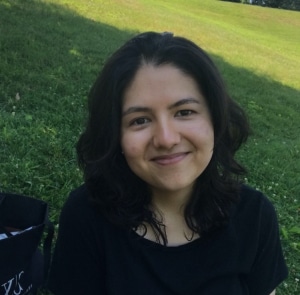
Sara is currently in the 4th year of the Physics Doctoral Program at The Graduate Center of the City University of New York. Her research investigates quantum transport properties of 2D electron systems.
Join Thousands of Students
How to Pursue a Doctoral Degree While Working Full Time
Balancing a career while pursuing a doctoral degree—or any degree for that matter—is not easy, but it is possible. With the right plan and support system in place, you can achieve your academic goals. Doctoral students learn—through research-based theory and practice—how to address the many challenges encountered across an array of professional fields. While obtaining a doctoral degree, students begin to integrate the practical skills that they are learning into their own professional careers, to ultimately emerge as leaders within their workplace or field. We recently spoke with a few Endicott College employees—Brittany Potter ’16 M’17, Assistant Dean of Academic Success, Sendy Suazo ’14 M’16, Community Outreach & Recruitment Coordinator, and Ian Menchini, Director, Graduate Enrollment & Advising—who are all currently pursuing their doctoral degrees while working full time. Here’s what they want you to know:
Leverage your everyday work
As you progress through the program, you’ll begin to notice that when you’re at work, you’re actually doing coursework—you’ll be able to relate real life experiences to the theories you’re learning. Recognize that you should be absorbing and taking your professional experiences into your academic assignments, it will be beneficial to your degree and you’ll see the relevance in your work.
Get organized
Understand that you are weaving your doctoral pursuits into your lifestyle. To figure out how it will fit, create a schedule and find your rhythm. Keep your goals in mind and plan your time strategically to account for coursework, but also for periods of rest.
Build a support network
You won’t be navigating through your program alone, your family, friends, and coworkers can all help to support you along your journey. Once you’ve identified a support network, determine how those people can assist you. You will be assigned a mentor who will act as a resource for you throughout your program and who will also serve as your dissertation advisor. Additionally, identify one or two members from your cohort to connect with—whether for assistance on projects or for accountability.
Your research topic
Choose a dissertation topic related to your career and identify a problem of practice within your professional field—your research will focus on how to solve that problem. Your mentor will help you narrow your topic, through concept mapping, continuous research, and further narrowing. S/he will help you figure out how to gather pertinent data and how to apply it to your topic. If you are unsure about your topic, your mentor will assist you in navigating through your interests to find what topics you are really passionate about. You’ll actually enjoy conducting research for your program because it's related to what you love to do. Click here to learn more about Endicott’s doctoral programs.
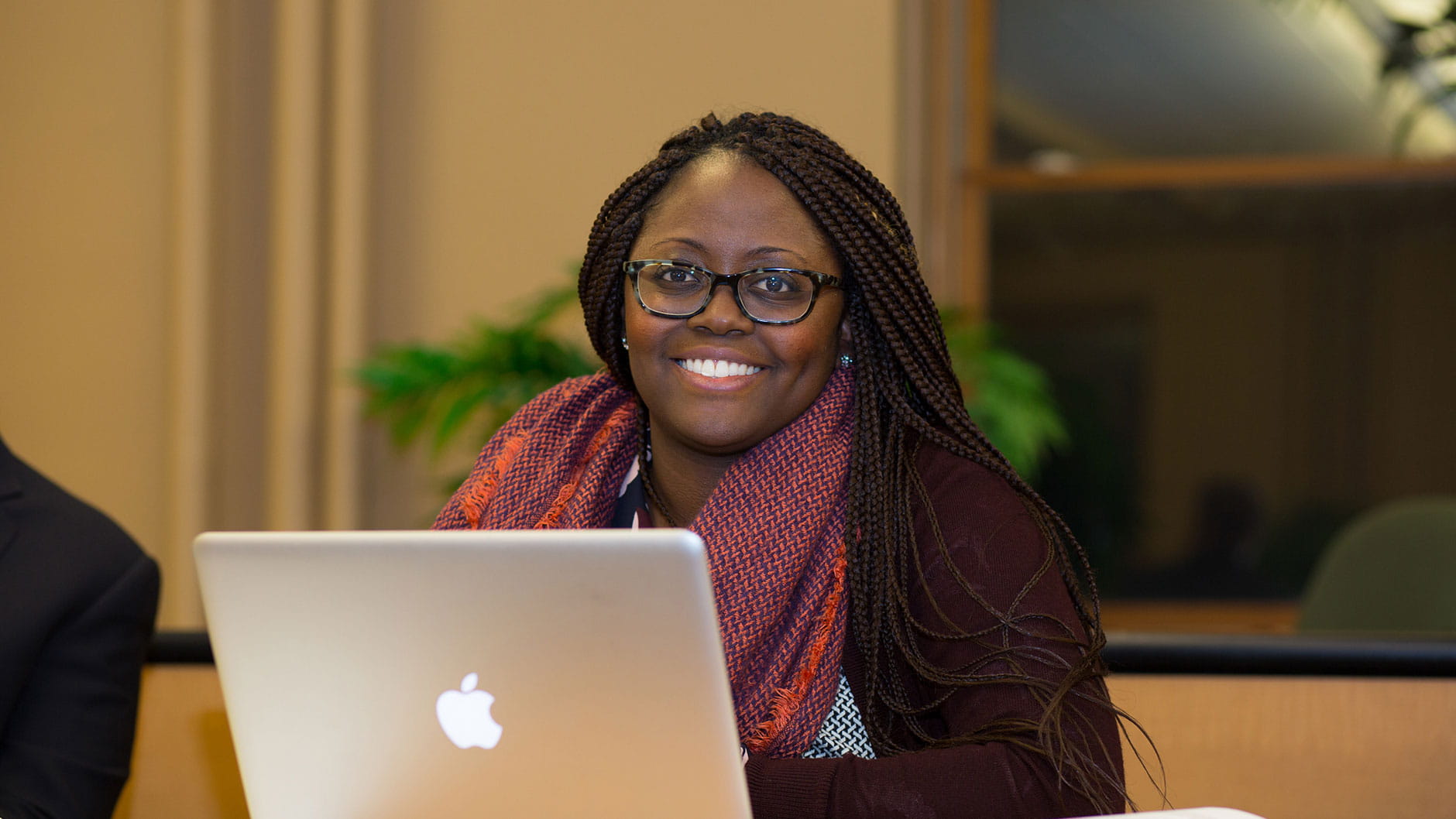
You're viewing this site as a domestic an international student
You're a domestic student if you are:
- a citizen of Australia or New Zealand,
- an Australian permanent resident, or
- a holder of an Australian permanent humanitarian visa.
You're an international student if you are:
- intending to study on a student visa,
- not a citizen of Australia or New Zealand,
- not an Australian permanent resident, or
- a temporary resident (visa status) of Australia.
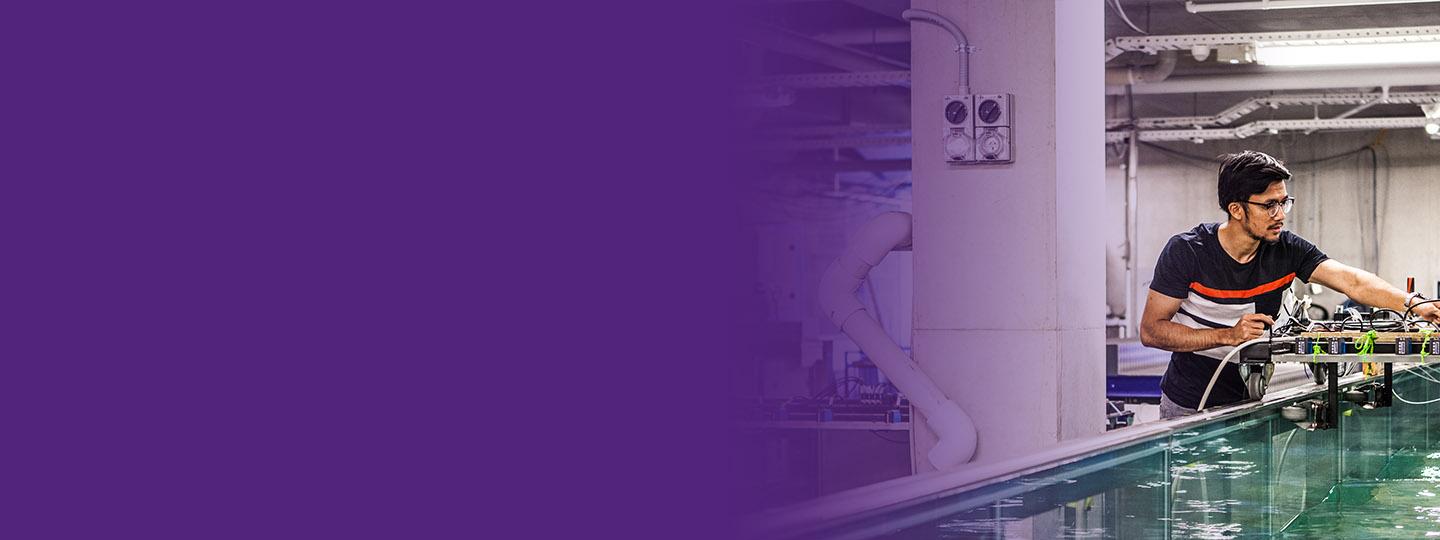
Can I do a PhD while working?
Study tips Published 31 Mar, 2022 · 4-minute read
Completing a Doctor of Philosophy requires some serious dedication. But committing all your time to research can leave a significant gap in your income. So, can you work and do a PhD at the same time? Let’s find out.
We spoke with two UQ PhD candidates, Chelsea Janke and Sarah Kendall, to get some insights into whether you can get a PhD while working – and how to balance your work with your research.
Can you get a PhD while working?
The simple answer is yes, but we wouldn't exactly recommend it. There’s nothing technically stopping you from continuing to work (at least, to some extent) while you pursue a PhD, but doing a higher degree by research is a big commitment. So, you need to think carefully before you attempt to juggle both.
The more complex answer is that it depends heavily on the type of work you’re doing and how quickly you want to complete your research.

PhD candidates can continue working part time while completing their research. Of course, this depends on the nature of their research and other work.
Keep in mind : some PhD scholarships are only available to full-time candidates and may not allow you to earn more than a certain amount to remain eligible. If you’ve applied or plan to apply for a scholarship, make sure to check the relevant terms.
For international students , some extra restrictions apply. You can work up to 40 hours per fortnight, but this must not interfere with your full-time study load or your academic performance. Further limitations may apply if you're on an RTP scholarship (maximum 270 working hours per year) or being sponsored by your government.
Doing a PhD while working: full time, part time or casual?
Chelsea is quick to warn us that both working and researching full time is a recipe for disaster.
“A full-time PhD could not be done whilst working full time,” she says.
Doing both part time is feasible, but only if you’re happy to wait a few extra years to see the fruits of your labour.
“I know people who have worked part time and done their PhD part time – usually in the same research group or field,” says Chelsea.
“But keep in mind it took them 7-8 years to finish their PhD; it’s not the most efficient strategy.”
Committing to a full-time PhD while doing some incidental work on the side seems like the most popular approach for candidates, in Chelsea’s experience.
“Most full-time PhD students will pick up some casual work tutoring, marking, helping the lab manager, or assisting other researchers with their work,” she says.
“This means they can do a few hours here and there without their own PhD work being too disrupted.”
Sarah’s circumstances allow her to maintain a part-time job while completing her PhD, though she acknowledges you have to be lucky to be in a position to do so.
“PhD candidates can continue working part time while completing their research; of course, this depends on the nature of their research and other work,” says Sarah.
“Both my research and work are very flexible, and I can complete them whenever suits me.”
Learn about Sarah’s research or read her series about becoming an academic in law .
How to balance work with your PhD

If you plan to work whilst doing your PhD, you will need to manage your time well.
It’s one thing to ask can I do a PhD while working – actually managing to juggle the two is a whole other challenge. Sarah and Chelsea agree that time management is the most important part of making this work.
Sarah suggests keeping a strict schedule to divide your time evenly between your commitments, as this is what works for her.
“I find that I maintain a balance best by setting specific hours to work on my PhD (usually from 9am to 4pm Monday to Friday) and then on my other work commitments (usually Saturdays and sometimes a couple of hours before dinner),” she says.
“The hours you set to work on your PhD and other commitments will depend on whether your other work has set hours though, as well as when you work best – you might get some of your best research and writing done at 5am!”
Top tips for working while doing your PhD
- Only do so if you really want/need to and if you know you can manage the dual workloads.
- Tell your boss. Make sure your employer knows about your plans to juggle a PhD with your workload. See if there’s anything they can do to make the journey easier for you. For example, just like Sarah, your employer may be able to provide you the flexibility to complete your work on a schedule that accommodates your research hours.
- Consider a part-time PhD if cutting your hours or quitting your job isn’t a viable option. Yes, it might take longer. But if it means maintaining a comfortable balance between your research and your current career, it might be the best choice for you.
- Chat with your PhD supervisor. They’ve been there and done that, making them a great source of wisdom when it comes to pursuing a PhD while also balancing your other life commitments. You may also have peers currently doing a PhD who can provide some advice.
Haven’t chosen your supervisor yet? Read these tips for finding a suitable academic. It’s also a good idea to be upfront with your supervisor about your intention to work/research part time, as some supervisors prefer to work with full-time PhD candidates.
- Seek casual work at your university and in your field where possible. By keeping your work and research close together (both in terms of location and mindset), you may find it less challenging to keep on top of both.
- Make sure you’re passionate about your PhD topic . If your research just feels like a second job on top of your usual work, you’ll likely burn out before long. When developing your research proposal , make sure your thesis is providing that spark of curiosity that’s going to keep you inspired to follow through with your research – even on nights when you’re drained from work.
Ready to get started? Whether you’re dedicating yourself to a full-time PhD or keeping a balance between research and work, The University of Queensland is ready to support you.
Learn more about completing your PhD at UQ
Share this Facebook Twitter LinkedIn Email
Related stories

How to get a PhD scholarship or funding
3-minute read

How long does a PhD take?

How to find a PhD supervisor
5-minute read

Is a PhD worth it?
9-minute read
2024 Best Online PhD Programs for Working Professionals
A growing number of colleges and universities offer online PhD programs for working professionals. These programs have the same level of rigor as traditional PhD programs, but they provide more accessibility and flexible scheduling.

Enrolling in a program designed for working professionals makes balancing academic, work, and family commitments easier.
Editorial Listing ShortCode:
Additionally, these programs can help you advance your career or transition to a new field.
Best Online PhD Programs for Working Professionals
Methodology: The following school list is in alphabetical order. To be included, a college or university must be regionally accredited and offer degree programs online or in a hybrid format.
Chatham University
A DNP in Nursing is available through Chatham University. The program is designed for working nurses who hold a master’s degree. Courses are fully online and are 15 weeks long. A short residency near the end of the program and a clinical are required. There are fall and spring start dates.
Chatham University is accredited by the Middle States Commission on Higher Education.
Colorado State University
Colorado State University offers multiple PhD programs. The degree in Systems Engineering is entirely online, while Higher Education Leadership and Organizational Learning, Performance and Change are in a hybrid format. Most online courses are in an asynchronous learning format. Courses are semester-based, and there are start dates in the fall and spring.
Colorado State University is accredited by the Higher Learning Commission.
National University
National University offers PhD programs with 4 week classes. The school currently offers 12 degree programs, including Instructional Design, Human Resource Management, and Data Science. Most programs are fully online and can typically be completed in 40 months.
National University is accredited by the WASC Senior College and University Commission.
Purdue University
Purdue University offers multiple online doctoral programs and degree including Higher Education and Education Leadership & Policy Studies. Both programs are in a hybrid format and require some courses on campus. Campus courses are offered on Saturdays. The program moves with a cohort and offers start dates each fall.
Purdue University is accredited by the Higher Learning Commission of the North Central Association of Colleges and Schools.
Sacred Heart University
A PhD in Social Work is available through Sacred Hearth University. Most courses are in an asynchronous format, and there are short residencies throughout the program. Courses are available part-time and last 14 weeks each. The program’s curriculum is designed to work around various schedules.
Sacred Heart University is accredited by the New England Commission of Higher Education.
Salve Regina University
Salve Regina University offers a PhD in International Relations degree. The program is fully online. To customize the program, 10 courses are selected suited to an area of interest with a dissertation. The program starts in the fall and spring.
Salve Regina is accredited by the New England Commission of Higher Education.
University of Central Florida
The University of Central Florida offers multiple PhD programs including Nursing and a BSN to PhD. GRE scores are not required. The programs require 6 to 72 credits. All coursework is fully online and in an asynchronous learning format. Degrees may be completed part-time.
The University of Central Florida is accredited by the Southern Association of Schools and Colleges.
University of Tennessee – Knoxville
A PhD in Industrial Engineering is offered through the University of Tennessee – Knoxville. Courses are online and may be attended synchronously or asynchronously. Courses follow a semester schedule and are offered in the fall, spring, and summer. The programs require 48 to 72 credits.
The University of Tennessee – Knoxville is accredited by the Southern Association of Colleges and Schools Commission on Colleges.
Walden University
Walden University offers an online PhD in Criminal Justice degree. All coursework is online with 4 on-campus residencies over the course of the program. A track selection is required based on whether the applicant holds a Master’s in Criminal Justice or another field. Accelerated tracks are also available.
Walden is accredited by the Higher Learning Commission.
Western New England University
Western New England University offers a PhD in Engineering Management. The degree can be completed fully online or in a hybrid format. The program is available full-time and part-time. The program requires 10 courses and a dissertation. Courses are 15 weeks long and follow a regular semester schedule.
Western New England University is accredited by the New England Commission of Higher Education.
Online PhD Programs for Working Professionals
Colleges offer online doctorate programs for working professionals in a broad range of disciplines. There are many factors to consider when choosing a program, including the potential career outcomes and the curriculum.
Here are some of the most popular online Ph.D programs. Select the program that most interests you to jump to that section of the guide:
- Online PhD in Business
- Online PhD in Computer Science
- Online PhD in Criminal Justice
- Online PhD in Education
- Online PhD in Engineering
- Online PhD in English
- Online PhD in Nursing
- Online PhD in Psychology
- Online PhD in Public Health
- Online PhD in Social Work
The online programs that are best for you will depend on your personal interests and professional goals.
PhD in Business Program

You can learn the ins and outs of the corporate world with a PhD in Business. This degree covers advanced topics like econometrics, management science, organizational behavior, and price theory. You’ll also research issues affecting corporations and the economy.
Graduates often apply their skills as professors of accounting, business, marketing, and other disciplines. They can also secure positions as business consultants, qualitative research analysts, senior data scientists, and more.
PhD in Computer Science

If you want to study and develop the latest technology, you might consider a PhD in Computer Science. You’ll take courses in subjects like computer architecture, intelligent systems, machine learning, and social computing.
Additionally, you’ll learn how to use empirical algorithmics, statistics, quantitative methods, and other tools to conduct research. Current professionals often work as college professors, computer and information research scientists, and computer systems engineers.
PhD in Criminal Justice

A PhD in Criminal Justice enables you to research complex issues impacting the criminal justice and legal systems. The curriculum typically includes topics like criminal justice policy, intelligence analysis, and contemporary criminological theory.
People who earn a PhD in Criminal Justice tend to pursue careers in academia, government entities, and law enforcement agencies. For instance, graduates may become fraud investigators, policy analysts, and researchers.
PhD in Education

If you want to research the science of learning, you might be interested in a PhD in Education. You can study subjects like applied linguistics, educational psychology, and special education. This degree also teaches you how to generate original scholarship on pedagogical approaches, theories, and issues.
A PhD in Education prepares graduates for academic and research careers. You might consider becoming a college professor, an educational research scientist, or a senior education administrator.
PhD in Engineering

You can expand your knowledge of advanced engineering approaches and theories with a PhD in Engineering. Programs often offer concentrations in areas like biomedical engineering, electrical engineering, and fluid and thermal systems.
You may also study research methods like data analysis and computational modeling. This degree can unlock careers in academia and the private sector. Current professionals work as consultants, innovation managers, research and development engineers, and professors.
PhD in English

A PhD in English might align with your interests if you’re passionate about literature and writing. This degree focuses on producing original analyses of books, films, and other media.
You may have the opportunity to take courses like composition theory, film theory, and Victorian literature. Graduates can use this degree to pursue careers as college professors, editors, high school English teachers, public relations specialists, and technical writers.
PhD in Nursing

A PhD in Nursing helps prepare you to conduct innovative research in clinical practice, healthcare policies, and nursing science.
Coursework may cover subjects like the evolution of nursing science, grant writing, and the role of the nurse scientist. You can also learn how to design experiments and use qualitative and quantitative research methods.
Many graduates apply their knowledge and research skills as clinical educators, healthcare consultants, and nurse scientists.
PhD in Psychology

A PhD in Psychology can deepen your understanding of human behavior, psychological processes, and mental disorders.
You can take courses like affective science, cognitive neuroscience, and statistical methods for behavioral sciences. You may also learn how to conduct ethical experiments with human subjects.
Current professionals frequently pursue careers as academic researchers, counseling psychologists, industrial-organizational psychologists, and neuropsychologists. Additionally, some graduates become professors.
PhD in Public Health

If you want to promote equity in healthcare, you might consider a PhD in Public Health. This degree helps prepare you to research challenges and policies affecting healthcare access and delivery.
Courses may address topics like environmental health, health concerns for women and newborns, and public health informatics. A PhD in Public Health helps prepare students for careers as health equity officers, nurse managers, and research scientists.
PhD in Social Work

If you want to research issues in social welfare, you may be interested in a PhD in Social Work. You can take courses like data management, human development in context, and public service and social change.
You’ll also learn how to apply social work theories and research methods to study challenges in the field. A PhD in Social Work can help unlock careers like community program administrator and field researcher.
PhD Careers & Salaries
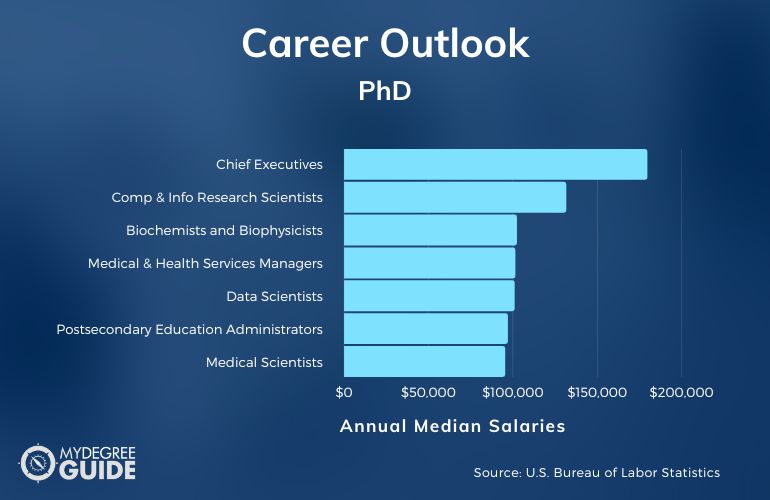
People who earn PhDs can pursue careers in academia, government agencies, and a wide range of industries.
Many graduates use their degrees to become professors at colleges and universities. These professionals teach courses in their discipline and mentor students. They also create and publish ground-breaking research in their areas of specialty.
According to the Bureau of Labor Statistics , here are the median salaries of careers often pursued by people with PhDs.
Government agencies also hire many people with PhDs. You might qualify for a career as a policy analyst or research associate.
The government also offers niche positions in specific fields. For instance, a graduate with a PhD in Criminal Justice could become an FBI agent, while someone with a PhD in Public Health could pursue a career as a health policy specialist.
Additionally, many graduates use their PhDs to become consultants for businesses, colleges, and other organizations.
Online PhD Degrees Admissions Requirements

The admissions criteria for remote PhD programs vary by college and discipline. It’s beneficial to research each school’s requirements ahead of time to ensure you meet the criteria.
Here are a few standard application materials you may be asked to provide:
- Personal statement
- CV or resume
- Letters of recommendation
- Official transcripts from previous postsecondary institutions
- Writing sample
You may also be required to submit GRE or GMAT scores, but many colleges have eliminated this requirement or made it optional.
Online Ph.D Programs Accreditation

As you research online doctorate programs, it’s essential to research each institution’s accreditation status. Regional accreditation is a mark of excellence that colleges and universities earn if they meet rigorous educational and ethical standards.
An external accrediting organization evaluates each school based on its curriculum, faculty credentials, and other criteria. Many employers hold PhDs from accredited institutions in high regard because they know graduates have received an excellent education. Also, it’s necessary to attend an accredited school to qualify for certain financial aid opportunities.
Online Doctoral Programs Financial Aid and Scholarships

Many doctoral students apply for financial aid to help pay for their remote PhD programs. PhD programs often offer full or partial funding packages that may include a stipend, tuition waivers, and other benefits. Many funding packages require students to work part-time as a research or teaching assistant for the department.
Additionally, you may qualify for grants, work-study programs, or student loans from the federal government. You can complete the Free Application for Federal Student Aid (FAFSA) to apply for these federal aid opportunities. Your college’s financial aid office can likely direct you to additional resources.
What Can You Do with a Doctorate Degree?

A doctorate degree can unlock many fulfilling and potentially lucrative career opportunities. According to the Bureau of Labor Statistics, the median usual weekly earnings for people with doctoral degrees is $1,909. Many graduates use their advanced expertise and research abilities to pursue academic careers. They often qualify for positions as college professors and researchers in their chosen disciplines.
Current professionals also work in advanced positions in the private sector. For instance, graduates with PhDs in Business often work as chief executives or management consultants, while people with PhDs in Nursing frequently become nurse educators.
Should I Get a PhD Online?

As you might expect, online Ph.D programs tend to be demanding and require significant dedication. Here are a few signs that an online doctoral program might be right for you:
- You’re passionate about your chosen discipline and want to develop greater expertise.
- You need a PhD to achieve your career aspirations.
- You want to produce and disseminate revolutionary research.
- You have strong critical thinking and time management skills.
- You’re interested in teaching and mentoring students.
- You thrive when you can learn and complete work independently.
An online PhD or online doctorates could be a strategic choice if you fit these criteria.
Can You Get a PhD Online While Working Full Time?

Yes, you can get a PhD online or a doctoral degree while working full time. Many remote PhD programs offer synchronous evening courses and asynchronous classes to accommodate the schedules of busy working professionals. These options provide maximum convenience and flexibility.
On the other hand, many students find completing the shortest PhD programs challenging while working full-time. Accelerated 1 year online doctoral programs enable students to finish their degrees quickly, but they typically require intensive full-time study. As a result, current professionals who want to continue working full-time often choose more extended programs to increase their likelihood of success.
How many PhD programs should you apply to ? The general advice from experts is to consider applying to a range of 4 to 6 PhD programs. This allows you ample time to dedicate to meticulously crafting strong and tailored applications for each institution.
Can You Get a PhD Without a Masters Degree?

The admissions criteria for online PhD programs vary by university. Many doctoral programs only accept applicants who hold a masters degree in a relevant field.
But, some PhD programs admit students who have only earned a bachelor’s degree. These students may have the option to earn a master’s degree during their studies or proceed directly to their PhD. Remote PhD programs may also consider applicants without a master’s degree who have extensive work experience in the field or have completed graduate-level coursework.
Are There Fully Funded Online PhD Programs?

Yes, there are fully funded online PhD programs . These programs cover most educational expenses, such as tuition. Additionally, they typically provide living stipends, health insurance, and other benefits. Fully funded programs may still require students to pay for miscellaneous expenses, such as student fees and textbooks.
Many fully funded PhD programs require students to work part-time in exchange for their tuition waiver and stipend. For instance, students may assist faculty with research projects or teach undergraduate courses. These commitments can help students develop new skills and strengthen their CVs.

Is a Part Time PhD Worth It?

Yes, a part time PhD is worth it for many working professionals. Part-time programs provide flexible course options and opportunities for independent research. As a result, this type of degree is the easiest PhD to get if you have a busy schedule or numerous personal and work commitments.
Additionally, earning a PhD part time can allow you to apply your new skills in the workplace immediately. For instance, you might learn a new theoretical approach in class and use it to solve a problem at your job. This practical application of knowledge can help you learn more efficiently.
Getting Your Ph.D. Degree Online

An online PhD program enables you to gain new skills and generate original scholarship in your field. You can study advanced theoretical concepts, design experiments, and learn the latest research methodologies.
Many remote PhD programs cater to working professionals by offering online classes and funding opportunities. Also, some colleges offer 1 year PhD programs online that can significantly accelerate your educational journey.
If you’re ready to advance your career and immerse yourself in research, you can get started by exploring accredited remote PhD programs in your field.


- Aimlay Foundation
- Pharma Courses
- Become a Partner
- Medical Courses
- Life@Aimlay
- Web Stories

- Thesis Writing
- Law Admission
- Dissertation
- Honorary doctorate
- Educational Academy
- Management Courses
- Research Paper Writing
- YouTube Journal
PhD | Thesis Writing | Law Admission | Dissertation | Biography | Pharma | Honorary doctorate | Educational Academy | Management Courses | Research Paper Writing | YouTube Journal
A Guide to Pursuing a PhD for Working Professionals
- November 24, 2023
- No Comments
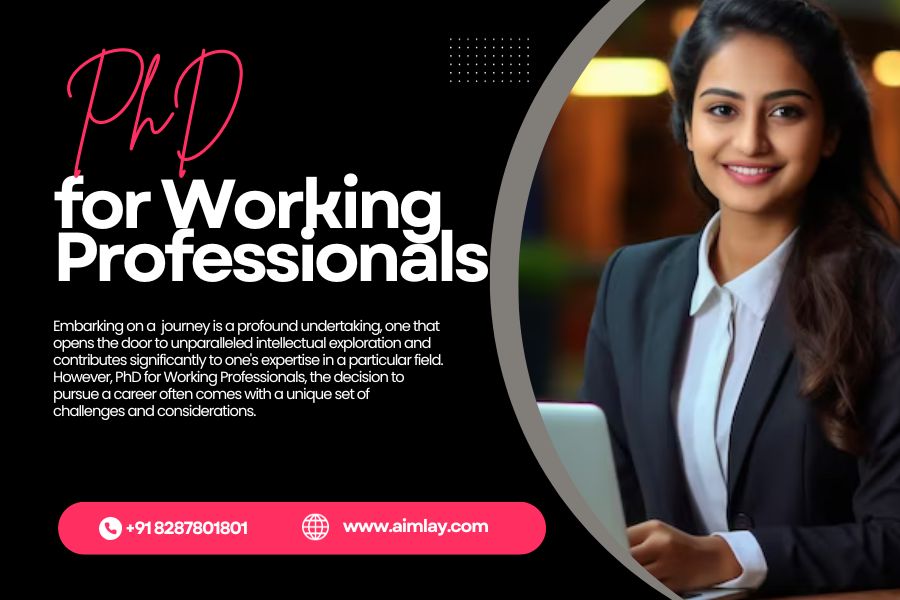
Embarking on a journey is a profound undertaking, one that opens the door to unparalleled intellectual exploration and contributes significantly to one’s expertise in a particular field. However, PhD for Working Professionals , the decision to pursue a career often comes with a unique set of challenges and considerations. In this blog, we’ll navigate the intricate path of earning a while managing the demands of a full-time job.
Table of Content
1. The Confluence of Work and Academia 2. Flexibility is Key 3. Balancing Act 4. Long-Term Investment 5. Funding Your Academic Odyssey 6. Tapping into Your Work Experience 7. The Remote Advantage 8. Staying Motivated 9. Enhancing Career Prospects 10. Resources for the Working Scholar 11. Can a Working Professional opt for a Flexible and Seamless PhD?
The Confluence of Work and Academia:
Many professionals find themselves at a crossroads, pondering whether to take the plunge into the world of academia while continuing their careers. The good news is that it’s not only possible but increasingly common. Universities around the globe now recognize the value of admitting experienced professionals into their programs.
Flexibility is Key:
One of the defining features of pursuing a as a working professional is flexibility. Unlike the traditional full-time programs, part-time or online options allow individuals to tailor their studies around their work commitments. This flexibility is a game-changer, making the academic pursuit accessible to those with busy professional lives.
Balancing Act:
Balancing a demanding job, family responsibilities, and rigorous academic studies is undoubtedly challenging, but it’s also a skill that many PhD for Working Professionals develop over time. Effective time management, setting realistic goals, and maintaining a strong support system are key ingredients to master this delicate equilibrium.
Long-Term Investment:
Pursuing a is a long-term investment, both in time and energy. It requires a deep passion for the subject matter, as well as a clear understanding of the potential benefits to your career. Consider how the doctoral journey aligns with your professional goals and contributes to your field of expertise.
Funding Your Academic Odyssey:
Finances are a significant concern for many considering that there are various funding options available. Some employers offer tuition reimbursement, and external scholarships, grants, or research assistant positions can ease the financial burden. Researching these opportunities is a crucial step in your preparation.
Tapping into Your Work Experience:
One of the perks of pursuing a as a working professional is the opportunity to intertwine your academic and professional worlds. Many programs encourage you to choose a research topic that aligns with your current job, enriching both your studies and your professional life.
The Remote Advantage:
Thanks to technological advancements, remote learning has become increasingly prevalent. While some programs may require occasional on-campus visits, many allow you to complete the majority of your requirements from the comfort of your home. This flexibility is a boon for those unable to relocate.
Staying Motivated:
A journey is a marathon, not a sprint. Setting clear goals, breaking down your research into manageable tasks, and celebrating small victories are crucial for maintaining motivation. Stay connected with peers, mentors, and support networks to keep the momentum alive.
Enhancing Career Prospects:
Beyond the intellectual and personal growth, completing a can significantly enhance your career prospects. In some industries, having a doctorate is a prerequisite for top-tier positions, and the expertise gained can open doors to new opportunities and challenges.
Resources for the Working Scholar:
Universities recognize the unique needs of working professionals pursuing a Many institutions now offer tailored resources, including online libraries, webinars, and support services. These resources are designed to empower working scholars to excel in both their academic and professional domains.

Can a Working Professional opt for a Flexible and Seamless PhD?
Absolutely, working professionals can opt for a flexible program, and Aimlay is an excellent platform that facilitates this pursuit. The traditional notion of a required full-time commitment and on-campus presence has evolved, and Aimlay, along with other flexible programs, is at the forefront of this transformation.
Here’s how a flexible with Aimlay can be a game-changer for working professionals:
- Online Learning Convenience: Aimlay offers online learning, providing the flexibility for working professionals to access course materials, lectures, and resources from anywhere in the world. This eliminates the need for physical relocation or disruptions to professional commitments.
- Part-Time Study Options: Aimlay understands the demands of a full-time job and allows for part-time study options. This means you can tailor your academic workload to fit around your work schedule, making it more manageable to balance both commitments.
- Personalized Study Plans: With Aimlay, working professionals have the opportunity to create personalized study plans. This allows you to pace your journey according to your own capabilities and time constraints, ensuring that you can maintain a healthy work-life- balance.
- Research Integration with Work: Aimlay encourages the integration of your research with your professional work. This synergy can enhance the practical application of your academic pursuits, providing real-world relevance to your research and potentially contributing to advancements in your field.
- Access to Industry Experts: Aimlay’s flexible programs often include collaborations with industry experts. This exposure can broaden your professional network, provide valuable insights, and potentially open up new opportunities within your current job or in related industries.
- Thesis Development at Your Pace: Completing a thesis is a significant aspect of a , and Aimlay’s flexible approach allows you to develop your thesis at a pace that aligns with your work commitments. This ensures that the quality of your research is not compromised due to time constraints.
- Global Learning Community: Aimlay fosters a global learning community, connecting you with fellow candidates and professionals from diverse backgrounds. This exposure to different perspectives can enrich your academic experience and contribute to a more comprehensive understanding of your research area.
- No Geographic Restrictions: One of the advantages of a flexible with Aimlay is the absence of geographic restrictions. You can pursue your doctoral studies without the need to relocate, allowing you to continue thriving in your current professional environment.
- Professional Development Opportunities: Aimlay often provides professional development opportunities alongside academic studies. This can include workshops, seminars, and networking events, further enhancing your skill set and career prospects.
- Ongoing Support and the Aimlay APP: Aimlay recognizes the unique challenges faced by working professionals pursuing a The platform typically provides ongoing support and mentoring to help you navigate the academic and professional aspects of your journey. The Aimlay app has come up with 150+ chapters on a PhD journey with interactive video learning. Download the app now and get started at your own pace.
Choosing for a journey as a working professional is a formidable yet rewarding endeavor. It requires dedication, strategic planning, and a genuine passion for knowledge. By embracing the flexibility of modern academic programs, leveraging work experience, and staying motivated throughout the process, you can successfully navigate the intricate path of earning a while flourishing in your professional life. Remember, the pursuit of knowledge knows no bounds, and with the right balance, you can achieve academic excellence without compromising your career. The ivory tower awaits, and you have the tools to ascend.
Share this Article
Send your query, leave a reply cancel reply.
Your email address will not be published. Required fields are marked *
Save my name, email, and website in this browser for the next time I comment.
Subscribe to Updates
Get the latest creative news from FooBar about art, design and business.
By signing up, you agree to the our terms and our Privacy Policy agreement.
10 Time Management Tips for Older PhD Students Who Want to Balance Work and Studies
Breaking barriers: empowering black women over 40 to excel in information systems phd programs. , the top 8 must-know tips for phd preparation: how to get started.
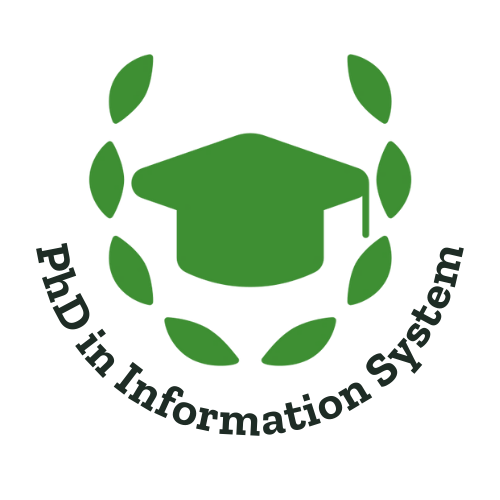
The Pros and Cons of Getting a PhD While Working
Can you do a PhD while working? Before you answer this question, let’s discuss the pros and cons.
Whether you should work while doing a traditional full-time PhD is an important question . No matter what others tell you, the answer is often very personal. The answer is also determined by personal factors (i.e., can you afford to live on a PhD stipend) and external factors (i.e., does the school allow working).
Nonetheless, knowing the answers before you start your PhD education will determine the schools and PhD programs to which you’ll apply. Hence, saving you time and energy at the outset.
Before you make that decision, here are some pros and cons of doing PhD While Working.
The Pros of Getting a PhD While Working
It goes without saying that working will provide additional income.
Let’s face it. Who doesn’t want additional money in their bank account?
Career options:
Working affords you the flexibility of choice. Being on both sides, industry, and academia gives you a breath of knowledge about what’s going on in the field (that’s if your work is related to your field of PhD study).
This keeps your knowledge relevant and gives you a choice to stay in academia or go back to industry.
Research data opportunities:
One thing researchers delight in is access to good-quality data. Organizations produce and have lots of good quality data.
When you’re working for an organization, you can access the organization’s data (with permission) for your research. Studies with this kind of data are sought after.
The Cons of Getting a PhD while Working
Divided attention
Since your time, interests, and goals are split between PhD while working and your PhD education, you may find that your attention is always divided between the two interests.
This presents time management challenges, worrying about whether you’re giving enough attention to each interest.
Low research productivity.
Given the divided attention and time challenges, your research productivity may suffer.
How? You may not have enough time to dedicate to the rigor of research. You’ll almost always exert the minimum effort needed to complete a research project.
Exerting minimum effort is a human condition but can negatively impact the quality and quantity of research you produce.
Difficulty in deciding a career path after graduation.
When you have one foot in industry and the other in academia, it makes it hard to decide which to continue after graduation.
I interned twice in public institutions when I was getting my PhD, with the possibility to stay on. Even though I was only interning, it was still a difficult decision for me.
To make that final decision, I asked myself whether the reasons I wanted to pursue a PhD/be an academic had changed. In other words, I went back to my WHY. The answer was No. So I’m still in academia.
I’m familiar with a PhD while working student in their final year who is finding it hard to make that decision. I can tell you that it’s not a simple decision.
High Quit Rate
Getting a PhD education at any age is not easy; how much more doing so in your 40s and 50s.
People do quit or drop out of their PhD education. They quit for many reasons, including a lack of support from the PhD program and the quality of relationship with an advisor .
However, it isn’t a stretch of the imagination to say that stretching yourself between work and the rigor of a PhD could lead to quitting intentions. You could tackle that research study: “ Does working increase the intention to quit in PhD students ?
Now that you’ve seen some of the pros and cons of working while getting a PhD, think carefully about your decision.
Everyone’s situation is different, so make this decision based on yours. If you do decide that you’ll work while doing a PhD, consider all the different types of doctorate degrees : traditional, DBA, executive, etc. A DBA or Executive PhD allows work and might fit you better.
However, you’ll have to fund your own education (self-funding). If you want external funding and still want to work, you need to seek out traditional PhD programs that might allow doing a PhD While Working.
There are a few. They do not advertise it that but I have seen some traditional programs where their students PhD While Working.
See more information on the difference between the different types of doctorate degrees . Send me a message if you have more questions on this topic.
What’s your story?
Related Posts
A 2023 resolution to start a phd in information systems – make a bold move, seeking a business phd as a black woman over 40 is a good thing, 7 career options: what you can do with a phd in information systems or technology, is it worth it to get a phd in information systems, you’ve decided to pursue a phd in your 40s – now, what, deciding to pursue a phd in your 40s and 50s, leave a reply cancel reply.
Save my name, email, and website in this browser for the next time I comment.
Type above and press Enter to search. Press Esc to cancel.
The Cabrini Blog
Filter Your View:
Narrow by Topic
- Activities and Events
- Just for Fun
- Living on Campus
- Service and Mission
4 Tips for Earning a Doctorate While Working Full Time
Posted on 1/16/2018 2:17:14 PM by Celia Cameron
I’m getting my PhD in Organizational Development (OD) at Cabrini University while working full time. Fortunately, my job offers some flexibility, but I still work 40-hour weeks while spending one weekend a month holed up with 10 other doctoral students and a bunch of OD experts exploring theory and research methods. A lot of my friends and family ask me, “How do you do it!?” So, I decided to share my four tips for balancing work, life, and grad school. 1. Get into a routine. Just like you know you’re going to get up at 6am, go to work, come home, eat, etc., it can help to create a routine of reading or writing for class. For me, I know I’m pretty useless after work, so I usually end up spending an hour or two a night reading for class. I don’t do much writing workday evenings, because my brain is mush. Then, I continue my M-F routine of getting up early on Saturday and Sunday and spend time writing. I’m in that rhythm and it really helps to keep me on track. 2. Know yourself. You need a lot of self-motivation to get a PhD … at least, that’s how it feels to me. If you aren’t good at scheduling your time or finding internal motivation, a doctoral degree may be extra challenging. You’ll have to schedule your time wisely, make sure you’re on top of your assignments, and try to think ahead for your dissertation. It can be overwhelming, and there have been days (or, maybe even weeks) in which I feel exhausted and burned out on reading and writing about organizational change or corporate social responsibility. But I am able to force myself through those times and stay focused on the long game. Soon, my classes will end and it will be unstructured dissertation time all the time (yikes!). That’s when the routine will (hopefully) help even more. 3. Talk to your advisor. My academic advisor is probably ready to ghost me, because I’m constantly checking in and emailing with ideas or requests for feedback. But it’s great! He tells me when my research topic seems to be on track, he guides me on how I’m doing in terms of writing and methodology, and is just a wonderful resource. If you’re working, it can be hard to meet face-to-face, but there’s beauty in Google Hangouts or Skype! Just staying connected helps me feel grounded, even if he’s telling me to relax and stay focused on the current class instead of thinking about what I need to do four months from now. 4. Find a little “me” time. I finally started going back to the gym in the last month, and just that little bit of healthy “me” time is helping to reset my mental state. I know that one of my classmates is big into mindfulness meditation as part of her routine for self-care. Whatever you do to decompress, it will be important to continue that practice to keep you focused and energized.
Getting a PhD is hard, but I knew that going into it. There are weeks where I’m frustrated and doubting my decision, but most of the time I can keep my end goal in sight. The PhD at Cabrini has been a great experience so far, and it’s taught me a lot about myself and about the possibilities of a new career. I hope I can keep on track as we move into the third year, which is all dissertation research, data analysis, and writing. This time next year, I should be staring down a dissertation defense and a doctoral degree to my name.
- Current Students
- Faculty and Staff
- Alumni and Friends
- Undergraduate
- Adult and Professional Studies
- Directory <
Want to Get your Dissertation Accepted?
Discover how we've helped doctoral students complete their dissertations and advance their academic careers!
Join 200+ Graduated Students

Get Your Dissertation Accepted On Your Next Submission
Get customized coaching for:.
- Crafting your proposal,
- Collecting and analyzing your data, or
- Preparing your defense.
Trapped in dissertation revisions?
Phd stipends: all your questions answered, published by steve tippins on june 26, 2022 june 26, 2022.
Last Updated on: 2nd February 2024, 03:04 am
What are PhD stipends? When you enter a PhD program, you can also get financial support in the form of tuition reduction, free tuition, and PhD stipends. That means compensation for work you’ll do, such as teaching or being a research assistant. Typically, traditional, face-to-face universities and PhD programs—as opposed to online programs from non-traditional schools—will compensate you for being a PhD student.
Do All PhD Students Get a Stipend?
Not all PhD students get stipends. However, most students in traditional programs do get stipends because these are full-time programs that require full-time attention, if not more.
It’s very difficult to keep a job of any kind and be in a full-time doctoral program. In order to have students at an institution, the institution has to make up for the income students lose by not working. PhD students are valuable labor for institutions because it costs less to pay them to teach classes and do research support than someone who has already earned a PhD .

What Is a Good Stipend for a PhD Student?
The average phd stipend.
The average annual stipend in the United States ranges between about $23,000 and $33,000 per year. You’re not going to get rich as a PhD student on one of these stipends, but you can survive.
The Highest PhD Stipend
The highest PhD stipends that most students can get are around $30,000 to $33,000. Interestingly, stipends vary by discipline. The higher stipends tend to be in disciplines where it’s harder to find doctoral students or easier to find PhD jobs.
Education or musicology will have a stipend below $20,000 on average, and there aren’t a lot of jobs for graduates in these disciplines. However, if you were to look at something like biomedical engineering, the stipend would probably be around $33,000.
There is a factor of supply and demand that goes into stipends, and these are averages across the US. They also vary slightly by institution.
Is a PhD Stipend Enough to Live On?

When you evaluate whether a PhD stipend statement is enough to live on, first think about where you’re going to school. Would $24,000 allow you to survive on your own in New York City? It would be really difficult to find someplace to rent under $2,000 a month. If you don’t have a strong desire to eat, maybe you could get by on something like that.
On the other hand, if you are somewhere like Little Rock, Arkansas, where rent might be $600 a month, then you have $1,400 left for other things like food. It might be possible there. Many doctoral students share apartments and have roommates to make it easier to survive financially.
Can I Work While Doing a PhD?
You may be able to work a little bit while doing a PhD, though it’s very hard to have time to do much else besides focus on your degree. Some people come from previous jobs and can continue consulting. Some faculty members run consulting businesses and employ students to do more work than the stipend has them assigned to do. Just be aware that if you start making outside work a priority, eventually your stipends will go away.
Is a PhD Stipend Taxable?

We aren’t qualified to give tax advice, but in most cases stipends are considered taxable income to the doctoral student.
How Can PhD Students Earn Money Besides Their Stipend?
There are ways doctoral students can earn money outside of their PhD student stipend . Some doctoral students tutor students on the side. It used to be you could sell textbooks back to the manufacturer, but that’s become increasingly rare now that most textbooks are going electronic.
There are other opportunities like consulting based on previous contacts or working along with other faculty members to help them in their projects.
In many cases, there are grants that you might receive in addition to your stipend. Apply for grants such as dissertation-writing grants or grants aligned with your demographic background or area of interest. Check with your institution’s financial aid office and with professional associations for grants.
How Often Is a PhD Stipend Paid?

PhD stipends are paid based on your university’s compensation schedule. If your university pays every two weeks, you’ll be paid every two weeks. If it pays once or twice a month, you’ll be paid once or twice a month.
Do PhD Stipends Increase Each Year?
Don’t count on a PhD stipend increasing every year. Universities have vast bureaucracies, and doctoral students are usually low on the pole of influence. If you get a stipend, assume that it will stay at that level.

Be sure to also check the maximum duration of a PhD stipend. Some institutions have limits, so be aware if the limit is less than the average time it takes someone to complete a PhD.
Final Thoughts
A PhD stipend is a great thing. It allows you to keep living, albeit barely, while digging deep into your preferred area of interest. In most cases and locations, it’s high enough to subsist but low enough that you don’t want to hang around at that level for a long time.
Steve Tippins
Steve Tippins, PhD, has thrived in academia for over thirty years. He continues to love teaching in addition to coaching recent PhD graduates as well as students writing their dissertations. Learn more about his dissertation coaching and career coaching services. Book a Free Consultation with Steve Tippins
Related Posts

A Professor’s Top 3 Pieces of Advice for Ph.D. Students
When it comes to getting a Ph.D., there is no one-size-fits-all approach to ensuring success in graduate school. Every student must find their own path to navigating the most rigorous academic experience that most people Read more…

PhD Graduates: A Guide to Life After Your Degree
What do PhD students do after they graduate? What should they do? And what are the unexpected challenges and limitations they encounter? The first thing a PhD graduate should do is rest and gather their Read more…

Average Age of a PhD Student: When Is It Too Late?
In 2020, the average age of a graduate from a PhD program in the United States was 33. However, 6% of the graduates were over 45. When people ask what the average age of a Read more…
Make This Your Last Round of Dissertation Revision.
Learn How to Get Your Dissertation Accepted .
Discover the 5-Step Process in this Free Webinar .
Almost there!
Please verify your email address by clicking the link in the email message we just sent to your address.
If you don't see the message within the next five minutes, be sure to check your spam folder :).
Hack Your Dissertation
5-Day Mini Course: How to Finish Faster With Less Stress
Interested in more helpful tips about improving your dissertation experience? Join our 5-day mini course by email!
Masters Compare - Find your perfect masters course.

- Living as a Postgraduate student
Working and studying for a PhD at the same time
Share this article.
- Facebook Sharer
- Twitter Sharer
- LinkedIn Sharer

Explore other topics
- Funding a Postgraduate course
- Popular masters degree subjects
- Student Wellbeing
- Studying a Postgraduate degree
- Finding a PhD or Masters Course
Think Postgrad
Frequently asked questions.
In short, yes, you can work while studying for your PhD.
The hard part to juggle is finding the time to do both. You may find that part-time study is more flexible for you but it takes longer to complete. An excellent way to combine work and study is to get a job within the university you are studying at.
Check out other sources of support for PhD Students .
There are several benefits to both full time and part time PhD study. It can be extremely difficult to juggle a full time postgraduate position alongside working. It’s not called full-time for nothing! This is intensive but you can complete a full time PhD faster than it’s part-time equivalent.
Studying for a PhD is a big commitment, either full time for 3-4 years or part-time for generally 6-7 years. If you want, or need, to be working and studying for PhD this could have an impact on your study: here are some of the things you may find it helpful to think about before starting your PhD.
Is funding for a PhD in the UK enough to live on?
If you are fortunate enough to have full funding for your PhD, your studentship should cover both fees and living expenses and be tax-free. The stipend levels for students studying for a PhD in the UK is set by UK research councils for their own studentships, and this is followed by Universities for their own studentships. These will provide enough to live on and not to have to be working and studying for a PhD.
If you are looking for PhD Funding, you can search for your ideal studentship from the many opportunities we have listed on Postgraduate Studentships. We have a section for Charities and Trusts who are set up to support students looking to get additional financial help with their studies.
How much work is included in a Graduate Teaching Assistantship?
Some PhD studentships are called Graduate Teaching Assistantships – this means that you will be teaching for a certain number of hours in each academic year and this is part of the conditions of the studentship. It is advisable to find out exactly how this works with the University advertising the opportunity. Will you receive separate payments or is this part of the studentship? How many hours will it involve and how will that relate to your PhD? Will you receive training?
If you are considering an academic career, there may be some advantage in getting some initial experience. However you may also struggle with working and studying for a PhD at the same time.
Should I study my PhD full-time or part-time if I need to work?
If you need to work and study, it’s important to think about how you will manage that. Can you study full-time and work at the same time and if so how much work can you do? A full-time PhD is regarded as a full-time commitment. So anything other than a supplementary job for a few hours per week is challenging. Some students start with a full-time PhD and then move to studying the PhD part-time. So you would need to discuss this with your university first.
Planning to study a part-time PhD takes longer overall but it may also give you the time to do your PhD and to make the money you need. If you do decide to study part-time you may already have a job that will allow you to have flexible hours. Think also about part time work in a field that relates to your study. If you need to look for a job that will help you do your PhD, your University is likely to have temporary or part-time jobs that students can apply for on campus – most universities have a database of these jobs for students so you can find out in advance what the pay rates are and if that would be enough.
Universities also have a range of part-time jobs which may be administrative or involve working in labs. If you apply for one of these jobs, especially in your own department, it’s important to make sure you work out how you will manage this. This way, you're prepared for when you are working on your PhD and when you are working on your job.
What if I am an International Student?
If you are an international student in the UK there will be restrictions on how many hours you can work. The UK Government has made some improvements to this. There are more opportunities now to study and work in the UK .
Talking to your University about your options
Your university wants you to succeed at your PhD. It has experienced students working whilst studying and works and what doesn’t. If you are planning to work whilst studying it’s a good idea to talk to your department. These questions may form part of your application process because your Supervisor will want to make sure you have the means to conduct your research as well as support yourself.
Many students study for a PhD and work for at least part of the time and complete their PhD successfully. If you look at the options beforehand, you can plan what works best for you. This way you can get the most from your PhD whilst working at the same time.
Looking for PhD Funding? There are a wide range of study funding opportunities for intending PhD students on PostgraduateStudentships
Receive Email Updates of the latest PhD and Masters opportunities and funding from PostgraduateStudentships and MastersCompare .
- Advertisers
- Cookie Policy
- Terms and Conditions
Sorry! You need to sign up
Sign up to Postgraduate Studentships
Sign up to compare masters
Opportunity added!
Thanks for making your selection. Click below to view your list.
Course Added
Thanks for making your selection. Click below to view your comparisons.

Think Postgrad Ltd 2008-2024 Website By Parachute

- Latest Posts
- Undergraduate Bloggers
- Graduate Bloggers
- Study Abroad Bloggers
- Guest Bloggers
- Browse Posts
- Browse Categories
Camille Bou
August 25th, 2021, working during your phd: opportunities to look out for.
2 comments | 4 shares
Estimated reading time: 5 minutes
If you’re finding yourself a bit short on your stipend at the end of each term, you may be looking for a part-time (PT) job to earn some extra income. Or perhaps you are seeking to broaden your horizons, gain some work and research experience outside of what is offered from the pursuit of your doctoral project. Whatever the reason may be, there is a range of opportunities available for PhD students:
- Occasional Research Assistantships (ORA) : LSE has a number of research centres that occasionally advertise for Research Assistants to help Principal Investigators with projects. For instance, the Centre for Economic Performance (CEP) has a call for Occasional Research Assistants and also advertises for summer placements. Faculty in your Department may also send the word out that they are looking for an ORA to help with a project; so keep your eyes peeled for internal communications.
- Graduate Teaching Assistantships (GTA) : Some Departments (e.g. Economics, International History, Methodology) have a large number of Undergraduate and Master courses for which they need Graduate Teaching Assistants. If you’re not from the Department that is hiring, it is still worth applying!
- Professional Service Staff roles (PSS) : The different divisions of the LSE (e.g. Student Housing, Research and Innovation, Eden Centre, Library, LSE Careers, Volunteer Centre, etc) may advertise for part-time roles. These are great opportunities to understand what it takes to keep the LSE running smoothly
- Working with the Student Union (LSESU) : at times, the LSESU advertises administrative, communication, or governance-based roles in their different teams.
- Leading an LSE Changemaker project : this collaborative programme between LSE and the LSESU provides students with 80 hours of funding to conduct an independent research project seeking to investigate and improve particular aspects of the LSE.
- Affiliated internship schemes : The PhD Academy is continuously building partnerships to offer more opportunities to PhD students, which they advertise in their newsletter. For instance, the Academy recently launched a micro-internship scheme , allowing PhDs to use their analytical skills for startups.
- Parliamentary Internships where you can assist an MP and gain some valuable experience working in UK politics.
- Working outside of the LSE if you’re looking to branch out: check out LSE Careers and LinkedIn for advertised roles, or work your network to find out if they are hiring!
In the PhD handbook, full-time PhD students are recommended to work no more than two days per week (or the equivalent) to ensure they can still finish their doctoral projects by their planned timeframe. Moreover, certain students will have Visa restrictions on how many hours they can work. Therefore, always check your capacity to work before applying for positions. It is advised you discuss your job applications with your supervisors so they can support you.
About the author

I'm Camille, a PhD student in the Department of Health Policy. I'm interested in how context shapes the experiences of young informal carers in the United Kingdom. When I'm not analysing data, I enjoy listening to music and podcasts, catching up on TV series, walking in London's abundant green spaces, and exploring the city’s diverse art, food, and drinks scene!
I am interested in part-time paid research opportunities in Social Sciences.
Hi Adedeji! If you are interested in research opportunities, please feel free to get in touch with the department of interest to see what’s available: https://www.lse.ac.uk/study-at-lse/meet-visit-and-discover-LSE/experience-lse/meet-our-departments
Leave a Comment Cancel reply
Your email address will not be published. Required fields are marked *
Notify me of follow-up comments by email.
Notify me of new posts by email.
Related Posts

A PhD Student’s Experience of CIVICA Coursework
March 30th, 2021.

ABC: My 3 struggles in the first year of my PhD (and how I overcame them)
March 31st, 2021.

How to Create Community during a PhD
June 3rd, 2020.

Advice for Incoming LSE PhD Students
July 14th, 2020.
Bad Behavior has blocked 1403 access attempts in the last 7 days.

Dr. Toni Merkey
Psychologist , phd (she, her).

My Practice at a Glance
Savannah, GA 31405
- Individual Sessions $150
- Pay by American Express, Discover, Health Savings Account, Mastercard, Visa
Qualifications
- Verified by Psychology Today Licensed by State of Georgia / PSY004015 Dr. Toni Merkey
- In Practice for 11 Years
- Membership with American Psychological Association
- Membership with Society of Clinical Psychology
- Attended University of Southern Mississippi , PhD , Graduated 2012
Specialties and Expertise
Top specialties.
- Emotion Regulation
- Coping Skills
- Healthy Communication Skills
- Life Coaching
- Life Transitions
- Mood Disorders
- Personality Disorders
- Pregnancy, Prenatal, Postpartum
- Women's Issues
Client Focus
Participants, communities, treatment approach, types of therapy.
- Acceptance and Commitment (ACT)
- Cognitive Behavioral (CBT)
- Dialectical Behavior (DBT)
- Integrative
- Mindfulness-Based (MBCT)
- Motivational Interviewing
- Positive Psychology
- Strength-Based
Primary Location
Nearby areas.
- Alpharetta, GA
- Atlanta, GA
- Savannah, GA
Neighborhoods

- FlashLine Login
- Phone Directory
- Maps & Directions
- About Overview
- Administration
- Facts & Figures
- Faculty & Staff
- Kent State Geauga News
- Support the Campus
- Twinsburg Academic Center
- Academics Overview
- Academic Advising
- Student Accessibility Services
- Course Schedules
- Distance & Online Learning
- Majors & Degrees
- Tutoring & Testing
- Academic Learning Commons
- Academic Workshops
- Before You Withdraw, Let's Talk
- New Student FAQs
- Spring 2024 Final Exam Schedule
- Student Services Staff
- Admissions Overview
- Referred to Regional Campus
- Visit Campus
- Newly Admitted Students
- Placement Testing
- College Credit Plus
- Tuition & Fees
- Financial Aid
- Scholarships
- Meet the Flashes
- Request Information
- Senior Guest Program
- Transfer Students
- Ohio College Comeback
- Campus Life Overview
- Flash Bistro
- Annual Scholarship Award Reception
- Bookstore and Spirit Wear
- Career Services
- Clubs & Organizations
- Community Job Openings
- Computer Labs
- Counseling Services
- Rising Scholars Program
- Technology Help
- Wellness Initiative
- Commencement
- Community & Partnerships Overview
- Events & Room Reservations
- Outreach & Partnerships
- Programs & Presentations
- Student Discounts
- Workforce Development - Geauga
- Workforce Development - Twinsburg
- Locations Overview
- East Liverpool
- Regional Campuses
- Other U.S. Academic Locations
- Kent State Worldwide
- Campus Safety Overview
- A.L.I.C.E. Training Workshops
- Campus Safety Staff
- Annual Security Reports
- Smoke-Free, Tobacco-Free University
Get to Know Your 2024 Kent State Geauga Student Commencement Speaker
- Share on Facebook
- Share on Twitter
- " class="social-sharing-google" title="Share on Google+"> Share on Google+
- Share on LinkedIn
- Share by Email

Wayne Nieh will be the 2024 commencement student speaker during the Kent State University Geauga and Twinsburg Academic Center Pinning and Commencement ceremonies on Friday, May 10. Wayne is not only the Valedictorian of his graduating class, but this inspiring scholar with a promising future has a dramatic backstory, a resolute sense of purpose, a remarkable set of achievements, and an over-arching attitude of humility.
Get to know Wayne, in his own words, in the Q&A below. Then come to the 2024 Kent State Geauga Commencement Ceremony at Parkside Church in Bainbridge to be inspired by his powerful message. The Nursing Pinning Ceremony will begin at 12:30 p.m. followed by Commencement at 2:30 p.m.
1. When you were a child, what did you want to be when you grew up?
When I was a child, I wanted to become a teacher, a scientist, a scholar, and/or an opera actor from the influence of my late beloved grandfather, who was the best mentor and friend of my childhood. He disciplined me to be a reader, a thinker, and a doer. At a young age, he also taught me Peking Opera, and I have enjoyed performing opera on stage since the age of 4. I had many dreams as a young boy; however, I loved my opera tapes and collections of books more than other things.
2. Where were you raised and when did you and your family immigrate to the U.S.? From what high school did you graduate?
I was raised in a beautiful northern Chinese village on a peninsula named Penglai. Our family owned cherry and apple farms as well as a vineyard. My hometown was very close to the Bohai Gulf, and all the fruit trees grew on the sand.
In December 2010, our family moved to the U.S., and we are very thankful for this country and all the opportunities including educational opportunities. I graduated from Solon High School, and I am truly thankful for my high school principals, guidance counselors, and many amazing teachers who supported and guided me through my high school journey, especially during the first year of my high school days when I could barely speak, read, and write in English.
3. Why did you choose to attend Kent State Geauga for your undergraduate studies?
During the COVID-19 pandemic, I read an article online about a Kent State University Geauga Campus BSN program and 2018 graduate Bailey Hill, who took the calling to spend four weeks at New York Presbyterian Hospital, an area in the COVID hot zone with a shortage of nurses.
I was moved, encouraged, and inspired by her story. In addition, I truly love the smaller nursing cohort learning environment—students know each other well, and we are like family members.
Moreover, I am very thankful for our BSN program coordinator, Melissa Owen, who loves and cares about all nursing scholars, and I have learned much from her lectures and through her character and leadership. I still remember our very first meeting online when my internet was very slow, and she was very patient in waiting for me. After the meeting, I knew this would be the best learning environment for me to pursue my nursing education and training.
4. Why did you choose to pursue a Bachelor of Science in Nursing (BSN) degree, what is your plan after graduation, and what is your ultimate career goal?
I chose to pursue nursing from the inspiration of my parents, who took good care of my grandfather after he suffered from three strokes, and they also taught me to be a compassionate and kind person, to serve others who were in need during my elementary school days.
When I turned 21, my mother went through cancer surgery, chemotherapy, and radiation therapy. My father took such good care of my mother, and I eye-witnessed many nurses who encouraged my mother and made a positive impact during her cancer treatment. I know that’s the desire of my life: to follow in the footsteps of my grandfather, my parents, and the inspiring nurses, serving the community with charity, compassion, and knowledge.
My ultimate career goal is to finish my doctoral degree in nursing and eagerly translate nursing research evidence into nursing clinical practice for better care outcomes.
5. Please describe how your 2021 and 2022 SURE (Summer Undergraduate Research Experience) research projects and presentations have informed your current work in the nursing field, and how Vitamin K therapy and the Family Willingness for Caregiving Scale (FWCS) may impact the course of your future endeavors in improving healthcare outcomes for patients. The 2021 SURE research project entitled “The Healing Potential of Vitamin K, The Forgotten Vitamin” under the supervision of my mentor, Dr. Popescu, opened the door to my path of research at Kent State University. The first SURE research project broadened my understanding of the importance, necessity, and power of research as a nursing student. Through this research project, I worked closely with the director of the Office of Student Research, Ms. Ann Gosky, who has been a blessing to me as a nursing student and student researcher at Kent State University.
After the first SURE research project, I knew I had the desire to broaden my understanding of nursing research. As a regional campus nursing student, I did not know any nursing research faculty from the Kent campus. During the 2021 winter break, Ms. Gosky helped me get connected with Dr. Amy Petrinec for my second SURE nursing research project.
Then I worked under the mentorships of Dr. Amy Petrinec and Dr. Cindy Wilk, testing a new instrument, Family Willingness for Caregiving Scale (FWCS), designed by Dr. Wilk during her PhD study. It measures the willingness of family members to become caregivers to a loved one receiving mechanical ventilation while in an adult intensive care unit (ICU).
I was humbled by this research study in the Summer of 2022, and Dr. Wilk taught me the art and techniques of therapeutic communications when recruiting eligible family members of ICU patients at Summa Health in Akron. This SURE experience surely exposed me to the power of nursing research in healthcare and trained my critical thinking and communication skills in a clinical setting, which helped significantly later in my nursing journey at Kent State University.
Dr. Petrinec and Dr. Wilk are diligent nursing professors, profound nursing scientists, and amazing thinkers and writers. Working under their mentorship taught me the lesson of humility because I can always learn new things from them, such as creative ways of thinking, better writing styles, and effective communication skills.
After my second SURE nursing research study, I was motivated, encouraged, and challenged by Dr. Petrinec and Dr. Wilk to propose my senior honors thesis study entitled “Family Presence During Resuscitation: A Descriptive Study of Perceptions of Nursing Students” in Fall 2022.
I am truly thankful for the support of the Honors College, McNair Scholars Program, and the Office of Student Research for this thesis study. Dr. Petrinec guided me through grant application, IRB application, Qualtrics design for instrumental surveys, and student recruitment as a BSN student. As time is approaching to my graduation, I truly want to express my sincere thankfulness to Ms. Gosky. Without her support, I wouldn’t be able to recruit any accelerated BSN scholars in Summer 2023, my mentor, Dr. Petrinec, the thesis committee (Dean Smith of Honors College, Dr. Wilk, Dr. Popescu, and Ms. Larubina), and Dr. Kutchin, who showed me how to recruit students for the thesis study with enthusiasm and passion.
Now, reflecting on my research journey at Kent State University, I have seen my mentor’s diligence and passion for nursing research, and her love and care for students, and I also learned the wisdom from Dr. Petrinec that nursing education is not merely the learning of facts, but the training of the mind to think, to be creative in problem-solving, and to lead with compassion.
Over the years at Kent State University, I participated in the 2021 SURE 3-minute thesis, and the 2022 Undergraduate Research Symposium, and presented my first SURE research work at the 2022 Summer Undergraduate Research Symposium at West Virginia University. I presented my second SURE study at the 2022 SURE 3-minute thesis and won second place; at the 2023 Undergraduate Research Symposium and won first place in the nursing category; at the 2023 Innovation Day for the Northeastern Ohio Public University Research Association (NEOPURA), at the 2023 KSU Honors Research Symposium and won the poster award, and at the SAEOPP McNair/SSS Research Conference in Atlanta, Georgia.
Lastly, I presented my honors thesis study at the 47th Biennial Convention in San Antonio, Texas; at the 2024 Midwest Nursing Research Annual Research Conference in Minneapolis; defended my thesis study on April 2, 2024; presented the thesis study at Sigma Collaboration with Case Western, Ursuline College, Kent State University, and University of Akron; at the 2024 Undergraduate Symposium at KSU and won the first place in the nursing category; at the 132nd Ohio Academic of Science Annual Meeting; and presented again at the KSU Honors Research Symposium on April 26, 2024.
No words can fully express my gratitude to Kent State University, my research mentors, and the supportive nursing faculty members from Kent and Geauga campuses. The opportunities I have had through KSU pave the way for me as a senior BSN student, to recognize the importance of research in clinical settings and provide tools to pursue and implement evidence from nursing research in clinical practice in the future for the advancement of the nursing profession, patient safety, and overall quality of care. 6. You have overcome many obstacles along your academic journey. Please describe what motivated you to work so hard and excel at many levels—and soon you will address your entire graduating class as their commencement speaker.
As an immigrant, my family has worked hard to overcome financial, cultural, and language challenges, and I have been studying very hard to overcome academic challenges.
However, I am thankful for the obstacles and challenges, for they have strengthened my character which shaped me to be the person I am today. When I was young, my late grandfather often taught me his wisdom in life (he underwent WWII and fought in the Chinese Civil War in the 1940s and lost one leg on the battlefield) that suffering produces endurance, endurance produces character, and character produces hope.
He also often taught me that the intelligent heart acquires knowledge, and the ear of the wise seeks knowledge. I strongly believe the wisdom and lessons that I learned from my late grandfather, and the exemplary life that he lived, motivated me to be the overcomer to face and work through the obstacles and challenges in my life with hope and strength.
7. Your grandfather also shared with you: “Diligence is the path to the mountain of knowledge; hard work is the boat to the endless sea of learning.” Please explain how this saying has encouraged you and how other people can be inspired by these words.
My late grandfather was a wise man, and many people including myself gained the benefits and wisdom from him through conversations. When he taught me this statement, I was too young to understand the depth of his wisdom. However, as I got older, I could grasp his wisdom that humility is essential in academia, especially in the nursing profession.
Nursing is a profession that requires both science and compassion, with nursing knowledge similar to the vast ocean. Thus, nursing requires students to be diligent in learning the mountain of knowledge, and it also requires us to be adaptive since evidence-based practices change over time through nursing research for the good. Over the years, I appreciate my grandfather’s words more and more that hard work is truly the boat to the endless sea of learning, and opportunities are usually disguised as hard work.
Through my nursing journey at Kent State University, I have learned that humility is needed in nursing, compassion is required to serve others, and hard work is the mark of a true scholar.
My research mentors are diligent nursing scientists who work hard in the profession, which reminds me of the words of the mother of our profession, Florence Nightingale, “Let us never consider ourselves finished nurses. We must be learning all of our lives.”
8. As President of the Geauga Student Nurse Association, President of the Geauga Gardener Club, Student Ambassador of the Office of Student Research, Student Leadership Intern of Delta Xi Chapter of the Sigma Theta Tau International Honor Society of Nursing, and Geauga Advisory Board Committee Member, please explain the importance of being involved in extracurricular organizations and activities… and how did you find the time considering your demanding academic schedule? When I was young, my grandfather taught me the essence of servant leadership, which focuses primarily on the growth and well-being of the people and the communities to which they belong. In addition, he taught me to love and serve others and not be rewarded and remembered.
I believe it is very humbling for me to serve others through my involvements in extracurricular organizations and activities, as I can always learn new things from advisors and other peers. Through the mentorship of Dr. Petrinec and Ms. Melissa Owen, I have learned that all nurses are leaders, and we need to be proactive advocates for our patients and our profession. Serving in various student organizations and activities has humbled me to communicate effectively and to serve others with flexibility, empathy, stewardship, and active listening skills which are required in my future nursing career.
Being a farmer disciplined me to think and plan for different seasons, to be responsible for feeding the animals on time, and to be more flexible with multitasking skills. My friends called me the “master of time management.”
I think my farmer background and nursing education at KSUG have trained me to set goals correctly, prioritize activities wisely, plan things ahead, and keep all things organized, which helped me manage all things well on top of the demanding academic and work schedule. I am not and will never be perfect in time management, and I am eager to constantly learn and improve myself in this area.
9. Please select three life lessons you have learned during your time at Kent State Geauga that will continue to serve you/help others in the future.
1. Active listening is powerful and silence is needed at times. 2. Clear communication can build trust in relationships. 3. Always ask questions in times of uncertainty and never make assumptions.
10. What is the essential message of your upcoming 2024 Commencement speech?
“We need each other, humility, and hope in the nursing profession.”
Spring 2023 - Delta Xi Chapter of Sigma International Honor Society of Nursing Induction with former Student Leadership Interns from Geauga Campus and two nursing faculty from Geauga Campus, Professor Kerry Myers and Professor Amy LePard.

2024 Midwest Nursing Research Annual Research Conference in Minneapolis with Dr. Petrinec (mentor), Dr. Hasen, Dr. Wang, and Dr. Reed.

Spring 2024 - Senior Honors Thesis Defense Committee Dr. Petrinec (mentor), Dean Smith (Honors College), Dr. Wilk (KSU CON), Dr. Popescu (KSU Geauga), and Professor Larubina (KSU Geauga).

Spring 2024 - Senior Honors Thesis Defense with KSU Geauga Faculty Members: Dr. Popescu, Professor LePard, Professor Larubina, and Professor Melissa Owen.

Spring 2024 - Senior Honors Thesis Defense with my wonderful mentor, Dr. Petrinec.

Spring 2024 - Senior Honors Thesis Defense with director of the Office of Student Research, Ms. Ann Gosky.

Spring 2024 - Senior Honors Luncheon with Honors Thesis Advisor, Ms. Marsha Kraus.
Geauga Campus Mailing Address
Geauga campus street address, twinsburg academic center mailing address, twinsburg academic center street address.
- Geauga Campus Phone 440-834-4187
- Twinsburg Academic Center Phone 330-888-6400
- Kent State Kent Campus - facebook
- Kent State Kent Campus - linkedin
- Kent State Kent Campus - twitter
- Kent State Kent Campus - instagram
- Annual Security Report -Geauga
- Annual Security Report -Twinsburg Academic Center
- Campus Safety
- For Our Alumni
- Hours of Operation
- Jobs & Employment
- Privacy Statement
- Website Feedback Form

IMAGES
VIDEO
COMMENTS
61. Each situation is different, and it might be hard to generalise, but roughly speaking, you can see a PhD thesis as requiring about 3-4 years working full time. For some people it might be a bit less, for others a bit more, but that's a good average. In addition, a PhD includes of course "technical" work, but also "academic training", such ...
The majority of the PhD students I know work at least 40 hours a week. So, trying to get a PhD while working is very time intensive - 80-hour + weeks. ... If you are receiving PhD funding or a scholarship from an external source, they may have stipulations on whether or not you can work while receiving their funding. Be sure to check with ...
In this case, an advisor at each school, a program representative, and even former students. The devil is in the details. They can help you better understand the program, the expectations, the challenges, and the best ways to overcome them. At this point, you should have an idea of whether earning a PhD while working full-time is feasible for you.
But keep in mind that some PhD part time programmes will not be eligible for financial aid or funding, at which point part time study may no longer be personally worth it. 2. Know Your Job. If your work is related to your field of study and your employers understand and support the requirements of your PhD, you will have a much less stressful ...
9. There are no real breaks. In a stereotypical "9-to-5" job, when the workday is over or the weekend arrives, you can generally forget about your work. And a vacation provides an even longer respite. But in a PhD program, your schedule becomes "whenever you find time to get your work done."
The short answer is: Yes, it's possible—and many people have done it. However, it can also be quite complicated. After all, balancing so many significant commitments can be a bit stressful. If you're thinking about earning your PhD while holding down a job, you'll need to do some careful planning and have sustained motivation to finish ...
Get organized. Understand that you are weaving your doctoral pursuits into your lifestyle. To figure out how it will fit, create a schedule and find your rhythm. Keep your goals in mind and plan your time strategically to account for coursework, but also for periods of rest.
The simple answer is yes, but we wouldn't exactly recommend it. There's nothing technically stopping you from continuing to work (at least, to some extent) while you pursue a PhD, but doing a higher degree by research is a big commitment. So, you need to think carefully before you attempt to juggle both. The more complex answer is that it ...
Yes, you can get a PhD online or a doctoral degree while working full time. Many remote PhD programs offer synchronous evening courses and asynchronous classes to accommodate the schedules of busy working professionals. These options provide maximum convenience and flexibility. On the other hand, many students find completing the shortest PhD ...
The best online doctoral programs offer flexibility and convenience that can make it easier for you to pursue an advanced degree, often while working full time. Earning a doctorate can help you ...
The Aimlay app has come up with 150+ chapters on a PhD journey with interactive video learning. Download the app now and get started at your own pace. Choosing for a journey as a working professional is a formidable yet rewarding endeavor. It requires dedication, strategic planning, and a genuine passion for knowledge.
Long-Term Career Prospects. You can greatly improve your long-term career prospects by obtaining a PhD while working full-time. It exhibits traits that employers highly value, such as a strong ...
Most universities will not allow it. Even working part time during your PhD can be a huge struggle, especially during the first two to three years (coursework and quals). Your time management skills will need to be very good, and you will need to be excellent at using your allotted work-time to get work done.
Being a Phd student is a full time job. There's no way that you can manage a proper full time job while doing one, at least not any serious sort of Ph.d. Part-time Phd is not really a thing, albeit with some exceptions. Some PhDs are designed for working professionals. Education and public policy come to mind.
The Cons of Getting a PhD while Working. Divided attention. Since your time, interests, and goals are split between PhD while working and your PhD education, you may find that your attention is always divided between the two interests. This presents time management challenges, worrying about whether you're giving enough attention to each ...
So, I decided to share my four tips for balancing work, life, and grad school. 1. Get into a routine. Just like you know you're going to get up at 6am, go to work, come home, eat, etc., it can help to create a routine of reading or writing for class. For me, I know I'm pretty useless after work, so I usually end up spending an hour or two a ...
The simple answer is yes, you can work while studying a PhD and in fact, many do. The most common form of work is teaching during your PhD. But some students may also have part-time (or full-time jobs outside of the university). Depending on the amount of work you plan to undertake, you will have to consider whether it would be better to do ...
The highest PhD stipends that most students can get are around $30,000 to $33,000. Interestingly, stipends vary by discipline. The higher stipends tend to be in disciplines where it's harder to find doctoral students or easier to find PhD jobs. Education or musicology will have a stipend below $20,000 on average, and there aren't a lot of ...
A full-time PhD is regarded as a full-time commitment. So anything other than a supplementary job for a few hours per week is challenging. Some students start with a full-time PhD and then move to studying the PhD part-time. So you would need to discuss this with your university first. Planning to study a part-time PhD takes longer overall but ...
A PhD really isn't something you can get while working a full-time job. You'll need too much time for the research. I finished my PhD while working, but I had been full-time in the PhD program for several years before that and my research was almost completely done at that point; I just needed to wrap everything up.
In the PhD handbook, full-time PhD students are recommended to work no more than two days per week (or the equivalent) to ensure they can still finish their doctoral projects by their planned timeframe. Moreover, certain students will have Visa restrictions on how many hours they can work. Therefore, always check your capacity to work before ...
2. When you consider your PhD programme, pick a topic you're passionate about that stimulates you. Any PhD degree involves a lot of hard work, but if you select a field you really like, you will not consider your PhD as a burden or as a difficult task in the long run. 3. Find the right supervisor for your PhD thesis. Ideally, you should ...
Dr. Toni Merkey, PhD, Psychologist, Savannah, GA, 31405, (912) 616-5493, Anyone can get "stuck" once in a while. Stuck on worries that won't ease up, actions that are unproductive or harmful ...
Get to Know Your 2024 Kent State Geauga Student Commencement Speaker | Kent State Geauga | Wayne Nieh will be the 2024 commencement student speaker during the Kent State University Geauga and Twinsburg Academic Center Pinning and Commencement ceremonies on Friday, May 10. Wayne is not only the Valedictorian of his graduating class, but this inspiring scholar with a promising future has a ...